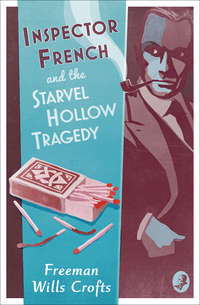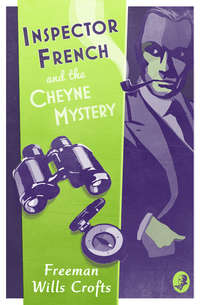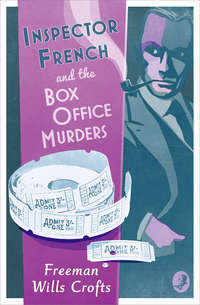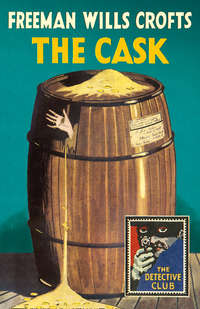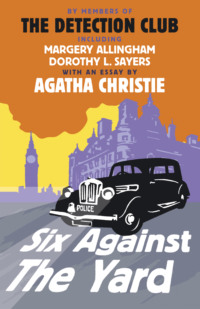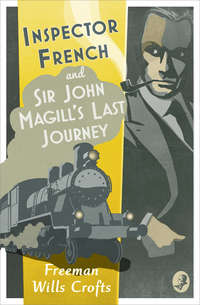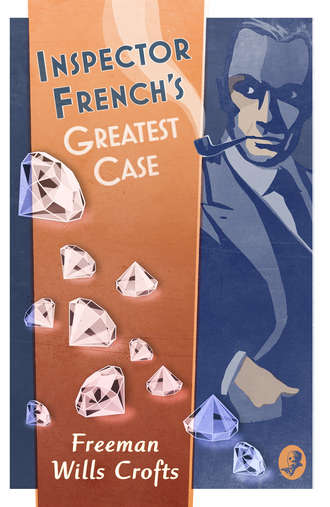
Полная версия
Inspector French’s Greatest Case
On the evening of his death it had been arranged that he would sit with Mrs Gething, in order to allow his daughter to attend a social connected with the choir of the church to which she belonged. But that evening he came home more worried and upset than she had ever seen him, and he had told her with many expressions of regret that some unexpected work which had just come in would require his presence that evening in the office, and that unless she was able to get someone else to look after her mother, she would have to give up her social. He had been too nervous and ill at ease to make a good meal, and had gone off about eight o’clock, saying he did not know at what hour he would be back. That was the last time she had seen him alive, and she had heard nothing of him until the policeman had come with his terrible news about half-past eleven.
Miss Gething was clearly at one with her sister in her admiration and affection for her father, and French recognised that she was as mystified as to his death as he was himself. Seeing that he could learn no more, he presently took his leave, with renewed expressions of sympathy for her trouble.
When he reached the Yard he found that enlarged photographs of the various finger prints he had discovered were ready, and he sat down with some eagerness to compare the impressions with those on his cards. He spent some time counting and measuring lines and whorls, and at last reached the following conclusions. All the finger marks on the safe, both inside and out, belonged either to Mr Duke or to Mr Gething, the majority being the latter’s; the mark on the handle of the coal shovel was Mr Gething’s, and the remaining prints were those of various members of the office staff. His hopes of help from this source were therefore dashed.
With a sigh he looked at his watch. There would be time before the inquest to make some inquiries as to the truth of Orchard’s statement of his movements on the previous evening. Half an hour later he had found the man with whom the clerk had dined in Ilford, and he fully substantiated the other’s story. Orchard was therefore definitely eliminated from the inquiry.
The proceedings before the Coroner were practically formal. Orchard, Mr Duke, and Constable Alcorn told their stories, and with very little further examination were dismissed. French and the local superintendent watched the case on behalf of the police, but did not interfere, and the next of kin of the deceased were not legally represented. After half an hour, the Coroner summed up, and the jury without retiring brought in the obvious verdict of wilful murder against some person or persons unknown.
That evening, when French had dined and had settled himself before the fire in his sitting room with a pipe between his lips and his notebook on the table at his elbow, he set himself to take mental stock of his position and get a clear grasp of his new problem.
In the first place, it was obvious that this Charles Gething had been murdered for the sake of the diamonds in Mr Duke’s safe. It was certain from the position of the wound that it could not have been accidental, nor could it by any chance have been self-inflicted. Moreover, a planned robbery was indicated by the cutting of the duplicate key. But the stones were not on old Gething’s body. It therefore followed that someone else had taken them, though whether Gething had abstracted them from the safe in the first instance was not clear.
So far French had no trouble in marshalling his facts, but when he attempted to go further he found himself in difficulties.
There was first of all Gething’s poverty. Though his salary was not unreasonable for his position, the drain of his wife’s illness had kept him continually struggling to make ends meet. French let his imagination dwell on the wearing nature of such a struggle. To obtain relief a man would risk a good deal. Then there was his knowledge of the wealth which lay within his reach, provided only that he made a spirited effort to obtain it. Had the man fallen before the temptation?
That he had had something on his mind for two or three weeks before his death was obvious, and it was equally clear that this was something secret. When Mr Duke inquired as to the cause of the trouble, Gething had mentioned family matters and his wife’s health, but when his daughter had asked the same question he had said it was due to business worries. The old man had therefore carried his efforts at concealment to direct lying to one or other.
It seemed evident also that this worry or trouble had become intensified on the evening of his death. He had told his daughter that special business required his presence at the office. But Mr Duke knew of no such business, nor was any record of it obtainable.
But all these mysterious contradictions fell into line and became comprehensible if some two or three weeks back Gething had decided to rob the safe, and his special agitation on the evening of his death was accounted for if that were the date he had selected to make the attempt.
On the other hand, several considerations did not support such a view. The first was the man’s known character. He had worked for the firm for over twenty years, and after all that experience of him Mr Duke absolutely refused to believe in his guilt. His daughters also evidently had the warmest feelings towards him, and from what French had seen of the latter he felt that would have been impossible had Gething been a man of bad or weak character. Such other evidence as French had been able to obtain tended in the same direction.
Next, there was the open way in which Gething returned to the office. Had he intended to burgle the safe, would he not have kept the fact of his visit a secret? Yet he told the office boy he was returning when instructing him to keep up the fire in the inner office, and he also mentioned it to his daughter when discussing her proposed choir meeting.
Further, there was this matter of the fire in the private office. If Gething was going to rob the safe, what was the fire for? It was not merely that he had instructed the office boy to keep it up. He had himself afterwards put coal on, as was evidenced by his finger marks on the handle of the shovel. The robbing of the safe would have been a matter of minutes only. Did the episode of the fire not look as if Gething really was employed at some exceptional work, as he had stated to his daughter?
On the whole, French thought, the evidence for Gething’s guilt was stronger than that against it, and he began to form a tentative theory somewhat as follows: That Gething, finding the conditions of his home life onerous beyond further endurance, and realising the unusually valuable deposit in the safe, had decided to help himself, probably to a quite small portion, knowing that the loss would fall, not on Mr Duke, but on the insurance company; that he had obtained an impression of the key from which he had had a duplicate made; that he had invented the business in the office as a safeguard should he be accidentally found there during the evening; that he had been found there, probably accidentally, by someone who, seeing the possibilities opening out in front of him, had been swept off his feet by the sudden temptation and had killed the old man and made off with the swag.
This theory seemed to meet at least most of the facts. French was not pleased with it, but it was the best he could produce, and he decided to adopt it as a working hypothesis. At the same time he kept an open mind, recognising that the discovery of some fresh fact might put a different complexion on the whole affair.
Next morning he put some obvious investigations in train. By astute indirect inquiries, he satisfied himself that neither Mr Gething nor any other worker in the Duke & Peabody office had the technical skill to have cut the key, and he put a man on to try and trace the professional who had done it. He issued a description of the stolen diamonds to the British and Dutch police, as well as to certain dealers from whom he hoped to obtain information of attempted sales. He saw that a general advice was sent to the banks as to the missing notes, and he searched, unsuccessfully, for any person who might have known of the treasure and who was unable satisfactorily to account for his movements on the night of the murder.
But as the days slipped by without bringing any news, French grew seriously uneasy and redoubled his efforts. He suspected everyone he could think of, including the typist, the office boy, and even Mr Duke himself, but still without result. The typist proved she was at home all the evening, Billy Newton was undoubtedly at a Boy Scouts’ Rally, while guarded inquiries at the principal’s club and home proved that his statement as to how he had passed his evening was correct in every particular. Stanley Harrington’s movements he had already investigated, and though the young man’s alibi could not be absolutely established he could find nothing to incriminate him.
Baffled in every direction, French began to lose heart, while his superiors asked more and more insistent and unpleasant questions.
4
Missing
About ten o’clock on the morning of the tenth day after the murder of Charles Gething, Inspector French sat in his room at New Scotland Yard wondering for the thousandth time if there was no clue in the affair which he had overlooked, no line of research which he had omitted to follow up.
He had seldom found himself up against so baffling a problem. Though from the nature of the case, as he told himself with exasperation, a solution should be easily reached, yet he could find nothing to go on. The clues he had obtained looked promising enough, but—they led nowhere. None of the stolen notes had reached the bank, nor had any of the diamonds come on the market; no one in whom he was interested had become suddenly rich, and all his possible suspects were able more or less satisfactorily to account for their time on the fatal evening.
French had just taken up his pen to write out a statement of what he had done, in the hope of discovering some omission, when his telephone rang. Absent-mindedly he took up the receiver.
‘I want to speak to Inspector French,’ he heard in a familiar voice. ‘Say that Mr Duke of Duke & Peabody is on the ’phone.’
There was a suggestion of eagerness in the voice that instantly roused the inspector’s interest.
‘Inspector French speaking,’ he answered promptly. ‘Good-morning, Mr Duke. I hope you have some news for me?’
‘I have some news,’ the distant voice returned, ‘but I don’t know whether it bears on our quest. I have just had a letter from Schoofs, you remember, the manager of our Amsterdam branch, and from what he tells me it looks as if Vanderkemp had disappeared.’
‘Disappeared?’ French echoed. ‘How? Since when?’
‘I don’t know exactly. I am having the files looked up to try and settle dates. It appears that he has been absent from the Amsterdam office for several days, and Schoofs thought he was over here. But we’ve not seen him. I don’t understand the matter. Perhaps if you’re not too busy you could come round and I’ll show you Schoofs’ letter.’
‘I’ll come at once.’
Half an hour later French was mounting the stairs of the Hatton Garden office. With a face wreathed in smiles, Billy Newton ushered him into the private office. Mr Duke seemed nervous and a trifle excited as he shook hands.
‘The more I think over this affair, Inspector, the less I like it,’ he began immediately. ‘I do hope there is nothing wrong. I will tell you all I know, but before I show you Schoofs’ letter I had better explain how it came to be written.’
He looked up interrogatively, then as French nodded, continued:
‘As I think I already mentioned, Vanderkemp is my travelling agent. He attends sales and auctions in all the countries of Europe. He has carried through some very large deals for me, and I have every confidence both in his business acumen and in his integrity. I told you also that amongst others he had purchased and brought to London the greater part of the missing stones.’
‘You told me that, sir.’
‘Of late years, when Vanderkemp is not on the road, he has been working in the Amsterdam branch. Some three or four days before poor Gething’s death he had returned from a tour through southern Germany where he had been buying jewels from some of the former nobility who had fallen on evil days since the revolution. Three days ago, on last Monday to be exact, I learnt that a very famous collection of jewels was shortly to be sold in Florence, and I wrote that evening to Schoofs telling him to send Vanderkemp to Italy to inspect and value the stones with a view to my purchasing some of them. This is Schoofs’ reply which I received this morning. You see what he says: “I note your instructions re sending Vanderkemp to Florence, but he had not yet returned here from London, where I presumed he was staying with your knowledge and by your orders. When he arrives I shall send him on at once.” What do you make of that, Inspector?’
‘Vanderkemp did not come to London, then?’
‘Not to my knowledge. He certainly did not come here.’
‘I should like to know why Mr Schoofs thought he had, and also the date he was supposed to start.’
‘We can learn that by wiring to Schoofs.’
Inspector French remained silent for a few moments. It seemed to him now that he had neglected this Dutch office. It was at least another line of inquiry, and one which might easily bear fruitful results.
The staff there, Mr Duke had stated, consisted of four persons, the manager, a typist, and an office boy. There was also at times this traveller, Vanderkemp, the same Vanderkemp who was uncle to Stanley Harrington. It was more than likely that these persons knew of the collection of diamonds. The manager would certainly be in Mr Duke’s confidence on the matter. Vanderkemp had actually purchased and brought to London a large number of the stones, which he had seen put into the safe, though, of course, it did not follow that he knew that they had been retained there. Besides, in the same way as in the London office, leakage of the information to outside acquaintances might easily occur. Inquiries in Amsterdam seemed to French to be indicated.
‘I think I shouldn’t wire,’ he said at last. ‘There is no use in starting scares unless we’re sure something is wrong. Probably the thing is capable of the most ordinary explanation. But I’ll tell you what I’ll do. I’ll slip across to Amsterdam and make a few inquiries. If anything is wrong I’ll get to know.’
‘Good. I’d be very pleased if you did that. I’ll write Schoofs and tell him to help you in every way that he can.’
French shook his head.
‘I shouldn’t do that either, if you don’t mind,’ he declared. ‘I’ll just go over and have a look round. There is no need to mention it to anyone.’
Mr Duke demurred, pointing out that a note from him would enlist Mr Schoofs’ help. But French maintained his ground, and the merchant agreed to carry out his wishes.
French crossed by the night service from Harwich, and at half-past eight o’clock next day emerged from the Central Station into the delightful, old world capital. Though bent on sordid enough business, he could not but feel the quaint charm of the city as he drove to the Bible Hotel in the Damrak, and again as, after breakfast, he sauntered out to reconnoitre.
Messrs Duke & Peabody’s office was close by in the Singelgracht, a semi-business street with a tree-lined canal down its centre, and crouching at one corner, a heavily-gabled church with a queer little wooden tower not unlike a monstrous candle extinguisher. French had opposed Mr Duke’s offer to write to the manager introducing him, as he did not wish any of the Amsterdam staff to be aware beforehand of his visit. He had on many occasions obtained a vital hint from the start or sudden look of apprehension which an unexpected question had produced, and he was anxious not to neglect the possibility of a similar suggestion in this case. He therefore pushed open the swing door, and without giving a name, asked for the manager.
Mr Schoofs was a dapper little man with a pompous manner and an evident sense of his own value. He spoke excellent English, and greeted his caller politely as he motioned him to a chair. French lost no time in coming to the point.
‘I have called, sir,’ he began in a harsh tone, not at all in accord with his usual ‘Soapy Joe’ character, while he transfixed the other with a cold and inimical stare, ‘with reference to the murder of Mr Gething. I am Inspector French of the Criminal Investigation Department of New Scotland Yard.’
But his little plot did not come off. Mr Schoofs merely raised his eyebrows, and with a slight shrug of his shoulders contrived to produce a subtle suggestion that he was surprised not with the matter, but with the manner, of his visitor’s announcement.
‘Ah yes!’ he murmured easily. ‘A sad business truly! And I understand there is no trace of the murderer and thief? It must be disquieting to Londoners to have deeds of violence committed with such impunity in their great city.’
French, realising that he had lost the first move, changed his tone.
‘It is true, sir, that we have as yet made no arrest, but we are not without hope of doing so shortly. It was to gain some further information that I came over to see you.’
‘I am quite at your disposal.’
‘I needn’t ask you if you can give me any directly helpful news, because in that case you would have already volunteered it. But it may be that you can throw light upon some side issue, of which you may not have realised the importance.’
‘Such as?’
‘Such, for example, as the names of persons who were aware of the existence of the diamonds in Mr Duke’s safe. That is one of many lines.’
‘Yes? And others?’
‘Suppose we take that one first. Can you, as a matter of fact, tell me if the matter was known of over here?’
‘I knew of it, if that is what you mean,’ Mr Schoofs answered in a slightly dry tone. ‘Mr Duke told me of his proposed deal, and asked me to look out for stones for him. Mr Vanderkemp also knew of it, as he bought a lot of the stones and took them to London. But I do not think anyone else knew.’
‘What about your clerk and office boy?’
Mr Schoofs shook his head.
‘It is impossible that either could have heard of it.’
French, though he had begun inauspiciously, continued the interrogation with his usual suavity. He asked several other questions, but without either learning anything of interest, or surprising Schoofs into showing embarrassment or suspicious symptoms. Then he turned to the real object of his visit.
‘Now about your traveller, Mr Schoofs. What kind of man is Mr Vanderkemp?’
Under the genial and deferent manner which French was now exhibiting, Schoofs had thawed, and he really seemed anxious to give all the help he could. Vanderkemp, it appeared, was a considerable asset to the firm, though owing to his age—he was just over sixty—he was not able to do so much as formerly. Personally he was not very attractive; he drank a little too much, he gambled, and there were discreditable though unsubstantiated tales of his private life. Moreover, he was of morose temper and somewhat short manners, except when actually negotiating a deal, when he could be suave and polished enough. But he had been known to perform kind actions, for instance, he had been exceedingly good to his nephew Harrington. Neither Schoofs nor anyone else in the concern particularly liked him, but he had one invaluable gift, a profound knowledge of precious stones and an accuracy in valuing them which was almost uncanny. He had done well for the firm, and Mr Duke was glad to overlook his shortcomings in order to retain his services.
‘I should like to have a chat with him. Is he in at present?’
‘No, he went to London nearly a fortnight ago. He has not returned yet. But I’m expecting him every day, as I have instructions from Mr Duke to send him to Florence.’
French looked interested.
‘He went to London?’ he repeated. ‘But I can assure you he never arrived there, or at least never reached Mr Duke’s office. I have asked Mr Duke on several occasions about his staff, and he distinctly told me that he had not seen this Mr Vanderkemp since two or three weeks before the murder.’
‘But that’s most extraordinary,’ Schoofs exclaimed. ‘He certainly left here to go to London on—what day was it?—it was the very day poor Gething was murdered. He left by the day service via Rotterdam and Queenborough. At least, he was to do so, for I only saw him on the previous evening.’
‘Well, he never arrived. Was it on business he was going?’
‘Yes, Mr Duke wrote for him.’
‘Mr Duke wrote for him?’ French echoed, at last genuinely surprised. ‘What? To cross that day?’
‘To see him in the office on the following morning. I can show you the letter.’ He touched a bell and gave the necessary instructions. ‘There it is,’ he continued, handing over the paper which the clerk brought in.
It was an octavo sheet of memorandum paper with the firm’s name printed on the top, and bore the following typewritten letter:
‘20th November.
‘H. A. SCHOOFS, ESQ.
‘I should be obliged if you would please ask Mr Vanderkemp to come over and see me here at 10.00 a.m. on Wednesday, 26th inst., as I wish him to undertake negotiations for a fresh purchase. He may have to go to Stockholm at short notice.’
The note was signed ‘R. A. Duke,’ with the attendant flourish with which French had grown familiar.
He sat staring at the sheet of paper, trying to fit this new discovery into the scheme of things. But it seemed to him an insoluble puzzle. Was Mr Duke not really the innocent, kindly old gentleman he had fancied, but rather a member, if not the author, of some deep-seated conspiracy? If he had written this note, why had he not mentioned the fact when Vanderkemp was being discussed? Why had he shown surprise when he received Schoofs’ letter saying that the traveller had crossed to London? What was at the bottom of the whole affair?
An idea struck him, and he examined the letter more closely.
‘Are you sure this is really Mr Duke’s signature?’ he asked slowly.
Mr Schoofs looked at him curiously.
‘Why, yes,’ he answered. ‘At least, it never occurred to me to doubt it.’
‘You might let me see some of his other letters.’
In a few seconds half a dozen were produced, and French began whistling below his breath as he sat comparing the signatures, using a lens which he took from his pocket. After he had examined each systematically, he laid them down on the table and sat back in his chair.
‘That was stupid of me,’ he announced. ‘I should have learnt all I wanted without asking for these other letters. That signature is forged. See here, look at it for yourself.’
He passed the lens to Schoofs, who in his turn examined the name.
‘You see, the lines of that writing are not smooth; they are a mass of tiny shakes and quivers. That means that they have not been written quickly and boldly; they have been slowly drawn or traced over pencil. Compare one of these other notes and you will see that while at a distance the signatures look identical, in reality they are quite different. No, Mr Duke never wrote that. I am afraid Mr Vanderkemp has been the victim of some trick.’
Schoofs was visibly excited. He hung on the other’s words and nodded emphatically at his conclusions. Then he swore comprehensively in Dutch. ‘Good heavens, Inspector!’ he cried. ‘You see the significance of all that?’
French glanced at him keenly.
‘In what way?’ he demanded.
‘Why, here we have a murder and a robbery, and then we have this, occurring at the very same time … Well, does it not look suggestive?’
‘You mean the two things are connected?’
‘Well, what do you think?’ Mr Schoofs replied with some impatience.
‘It certainly does look like it,’ French admitted slowly. Already his active brain was building up a theory, but he wanted to get the other’s views. ‘You are suggesting, I take it, that Vanderkemp may have been concerned in the crime?’


